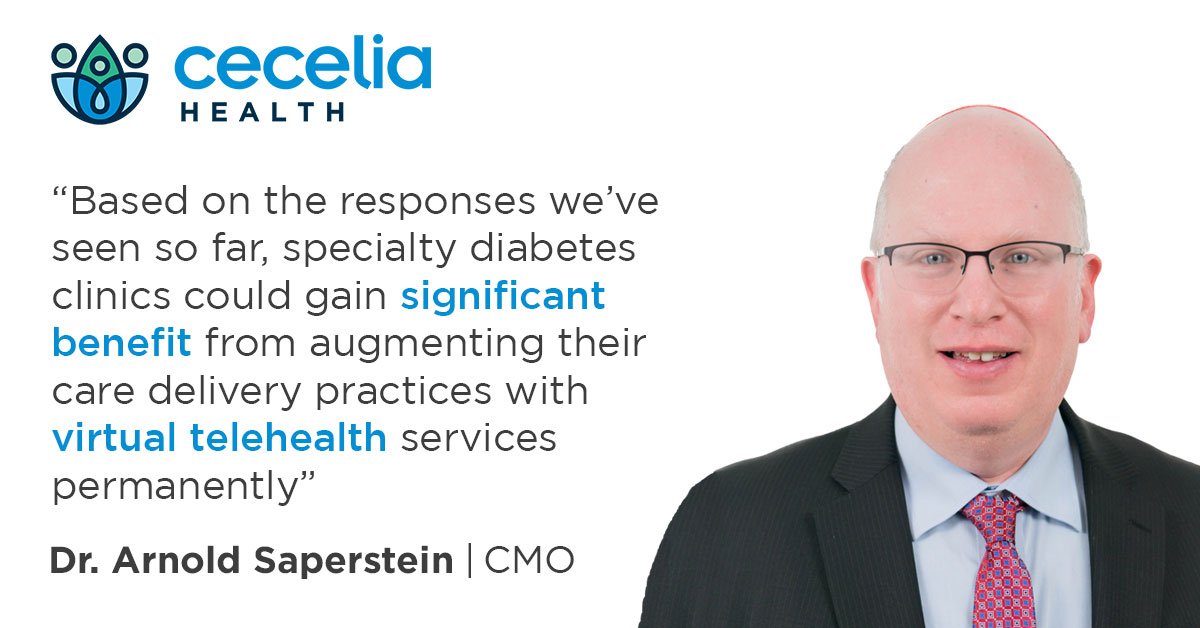I’m very excited to share that Cecelia Health has recently launched a promising new initiative focused on providing virtual clinical support to diabetes specialty clinics around the United States. First, I’d like to call out just how impressed I am with our team and their ability to launch a complex, virtual diabetes support program in just a matter of weeks. The Helmsley Charitable Trust, funded this effort to assist outpatient clinics and patients that have been adversely impacted by the COVID-19 pandemic by providing telehealth support to increase care capacity and create efficiencies in care delivery. The size and experience of the Cecelia Health clinical team really placed us in a unique position to be able to partner with these clinics. Importantly, our specialty practice partners have shared with us that our ability to provide care has been a tremendous value add to physicians and patients.
While the healthcare community has been intensely focused responding to COVID-19, people with diabetes have faced extra challenges in receiving the full range of care they need given the strain on the system. While Diabetes is difficult to manage during normal times, COVID-19 has created added layers of complexity to disease management. It’s been that much more difficult to access in-person care, obtain adequate supplies of medication, remain adherent, and live a healthy lifestyle in a socially distant world.
Enter Cecelia Health to provide additional clinical capacity to leading diabetes clinics in the form of virtual support to Type 1 and Type 2 diabetes patients of all ages who have been using the full spectrum of diabetes monitoring and pump technologies on the market. We have been able to successfully educate patients to interpret the data output from their devices and provide them with the knowledge to adjust their diet and lifestyle to enable them to live a life unencumbered by diabetes. Additionally, we’ve empowered patients to become their own health advocates by helping them to download their Continuous Blood Glucose (CGM) data to drive discussions with their endocrinologists.
While the primary focus of our team has been to address diabetes related needs, our clinicians have also responded to the social and economic implications resulting from COVID-19. They have been directing patients to community-based organizations to assist with Social Determinants of Health (SDOH) and providing assistance with financial support tools as patients face economic challenges to access their medication. In sum, the Cecelia Health team has been able to provide support related to every single aspect of successful diabetes management to a diverse set of populations.
What We’ve Learned:
- It’s evident to our team that the value gained from using a CGM device does not just result from prescribing the device. Patients must understand how to initiate and persist using a CGM device and use it to streamline their diabetes management routine.
- One of the most useful features of modern CGM devices is the ability to easily share data with the clinician ahead of a scheduled appointment. Unfortunately, what we are seeing in practice is that a lot of people arrive unprepared, not having been able to set up their device correctly to share this information. This is an avoidable bottleneck in the clinical workflow and can be easily addressed by providing further education to ensure that the focus of the in-person or virtual visit is on interpreting the data and making meaningful changes – and not on setting up the device.
- Most people have initiated on their device when a Cecelia Health clinician reaches out, but they need a lot more data training after setting up. Many people struggle to understand how to optimally download the data after initiation.
- People need human support when dealing with the challenges associated with a new diagnosis or ongoing disease management. Our clinicians have been able to improve people’s understanding of their disease as well as provide overall health and well-being support. Sometimes even being able to speak to someone who understands what you are going through goes a long way.
- Based on the responses we’ve seen so far specialty diabetes clinics could benefit from augmenting their care delivery practices with virtual telehealth services permanently as it’s clear that a virtual partner can streamline clinical workflow efficiency and improve patient outcomes.
The implications of the COVID-19 pandemic have accelerated the adoption of telemedicine out of necessity and have laid the groundwork for this mode of care delivery as the new normal for those with chronic diseases. Through this initiative, Cecelia Health has set the standard for how remote care can positively impact the lives and outcomes for people living with diabetes throughout the country.
Would you like to learn more?
About the Author

Arnold Saperstein MD, FACP, began his career in managed care in 1992 and joined MetroPlus Health Plan in 1995 initially as Chief Medical Officer and then as President and CEO from 2006 until 2019. MetroPlus Health Plan, a wholly-owned subsidiary of the New York City Health + Hospitals is a managed care organization that, under Saperstein’s leadership grew from 40,000 members to over 500,000 members with an estimated 32,000 participating providers. Dr. Saperstein has spent the majority of his career developing programs that ensure the highest quality of care. During his tenure at MetroPlus, it ranked as one of the highest-scoring plans for quality of care as measured by the New York State Department of Health Medicaid Incentive Program and by the Medicaid Consumer Guide for New York City. Under his leadership, MetroPlus rose to the forefront of Value-Based Purchasing. Programs he developed included groundbreaking quality incentive pay for performance programs across the entire MetroPlus network.
Get in contact with Dr. Saperstein:
Email: asaperstein@ceceliahealth.com
LinkedIn: Dr. Arnold Saperstein
